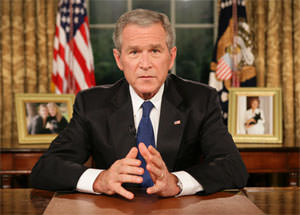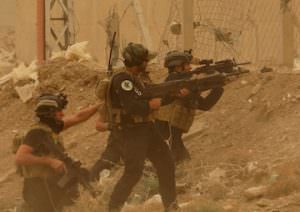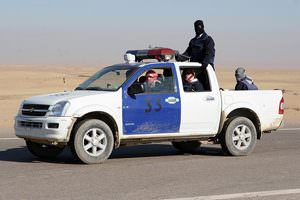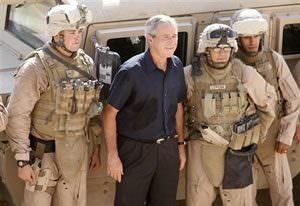Mission … Evolving
President Bush capped off his administration's weeklong campaign to convince America that the "surge" is working with a televised address on Thursday. Nestled among assorted pseudo-announcements and stale slogans was a telling pitch from a president who has repeatedly revised his motive for war: "Our mission in Iraq will evolve."
President Bush capped off his administration’s weeklong campaign to convince America that the “surge” is working with a televised address on Thursday. Nestled among assorted pseudo-announcements and stale slogans was a telling pitch from a president who has repeatedly revised his motive for war: “Our mission in Iraq will evolve.”
The surreal timeline of the Iraq war is littered with moments like these — too many about-faces and nonsensical blunders to keep a firm grip on reason. Bush invaded a country to rid it of imaginary weapons of mass destruction. When he didn’t find any, he declared victory and changed the mission to democracy building. When that strategy led to a theocratic government unresponsive to sectarian bloodletting, the mission became about stability. And now, the one goal supporters of the war seem determined to realize is to achieve some vague, if delusory, sense of victory.
So, the president tells us, as we attempt to follow his circuitous logic, that the mission is evolving, as though it were some determined organism destined to adapt to adversity and thrive.
“General Petraeus also recommends that in December, we begin transitioning to the next phase of our strategy in Iraq. As terrorists are defeated, civil society takes root, and the Iraqis assume more control over their own security, our mission in Iraq will evolve,” Bush proclaimed from his Oval Office desk on Thursday. “Over time, our troops will shift from leading operations, to partnering with Iraqi forces, and eventually to overwatching those forces. As this transition in our mission takes place, our troops will focus on a more limited set of tasks, including counterterrorism operations and training, equipping and supporting Iraqi forces.”
Doesn’t that sound wonderful? Terrorists defeated, civil society taking root — it’s almost enough to make us forget we’ve heard it all before. That’s just the problem with propaganda in the Information Age — fact travels as fast as fiction.
Take, for instance, the president’s and Gen. Petraeus’ celebration of Anbar province, which they would have us believe is Iraq’s answer to Beverly Hills, thanks to the surge. The administration’s insistence aside, only 38 percent of Anbar residents rate security positively, and one of America’s much publicized allies in the region, Abdul-Sattar Abu Risha, was just assassinated. How many soldiers had to die to achieve such stunning success?
The mission is “evolving” because it is the best way to conceal that there is no longer a coherent mission, if there ever was one.
Just ask the surviving members of a brave group of active-duty soldiers who offered their take on the war in a New York Times article they wrote shortly before one of them was critically injured and two others were killed. Here are just a few insightful excerpts from their seminal essay:
“Viewed from Iraq at the tail end of a 15-month deployment, the political debate in Washington is indeed surreal.”
“In short, we operate in a bewildering context of determined enemies and questionable allies, one where the balance of forces on the ground remains entirely unclear.”
“Four years into our occupation, we have failed on every promise, while we have substituted Baath Party tyranny with a tyranny of Islamist, militia and criminal violence. When the primary preoccupation of average Iraqis is when and how they are likely to be killed, we can hardly feel smug as we hand out care packages.”
Well said. Now if only we could get that on television.
President Bush’s prepared address:
Good evening. In the life of all free nations, there come moments that decide the direction of a country and reveal the character of its people.
We are now at such a moment.
In Iraq, an ally of the United States is fighting for its survival. Terrorists and extremists who are at war with us around the world are seeking to topple Iraq’s government, dominate the region, and attack us here at home. If Iraq’s young democracy can turn back these enemies, it will mean a more hopeful Middle East and a more secure America. This ally has placed its trust in the United States. And tonight, our moral and strategic imperatives are one: We must help Iraq defeat those who threaten its future and also threaten ours.
Eight months ago, we adopted a new strategy to meet that objective, including a surge in U.S. forces that reached full strength in June. This week, General David Petraeus and Ambassador Ryan Crocker testified before Congress about how that strategy is progressing. In their testimony, these men made clear that our challenge in Iraq is formidable. Yet they concluded that conditions in Iraq are improving, that we are seizing the initiative from the enemy, and that the troop surge is working.
Click here to read more about Army Sgt. Omar Mora in the Houston Chronicle.
Your support matters…Independent journalism is under threat and overshadowed by heavily funded mainstream media.
You can help level the playing field. Become a member.
Your tax-deductible contribution keeps us digging beneath the headlines to give you thought-provoking, investigative reporting and analysis that unearths what's really happening- without compromise.
Give today to support our courageous, independent journalists.



You need to be a supporter to comment.
There are currently no responses to this article.
Be the first to respond.